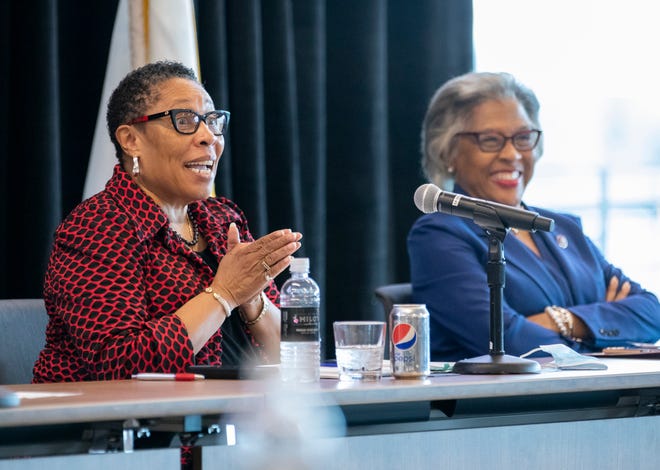

Ohioans need to make more than $19 hourly to afford an apartment in Columbus if they want to limit housing costs to 30% of their income.
Those who earn minimum wage must work 74 hours each week to afford a two-bedroom home at the state's fair market rent of $832, according to data from the National Low Income Housing Coalition.
For a one-bedroom? Fifty-eight hours.
The climb to create more affordable homes is steep as housing costs outpace people's income and expensive materials like lumber squeeze the bottom line for developers. To combat that, U.S. Secretary of Housing and Urban Development Marcia Fudge has a message for Ohio communities: We need your help to give people a good home.
"We know that we need about 11 million houses in this country," Fudge said in Columbus. "We cannot build our way out of this problem. The federal government can’t provide enough resources."
Discussing housing in Ohio with local stakeholders
Fudge visited Ohio Friday to encourage people to get vaccinated and discuss housing with local stakeholders at Columbus State Community College. Her visit came on the heels of the announcement that President Joe Biden reached a $1.2 trillion infrastructure agreement with a bipartisan group of lawmakers, including Ohio Sen. Rob Portman.
Fudge, who previously represented Ohio's 11th Congressional District, said the negotiations proved that democracy can work and will lead to greater investments for transit, rail and broadband. The proposal still needs to make its way through Congress.
“It may not be all we want it to be, but it’s a great start," she said.

Fudge and U.S. Rep. Joyce Beatty joined leaders from organizations like IMPACT Columbus and the Affordable Housing Alliance of Central Ohio to discuss barriers that keep people on the streets. Among them: Outdated public housing, a shortage of multi-family housing options and student loan debt that saddles renters and buyers. In Columbus, Beatty said, the housing supply hasn't kept up with population growth.
Fudge also noted that the ownership gap between white and Black people is the same as it was in 1968, when the Fair Housing Act became law in the United States.
"We have always found ways to discriminate against poor people and people of color," she said.
Fudge and Beatty both touted Biden's American Jobs Plan, which officials say would provide billions of dollars to create 1 million housing units for low-income families and encourage communities to replace zoning laws that limit development, among other provisions.
But Beatty said local and state governments must come together to address the housing crisis — along with Republicans and Democrats in Congress — and can't rely solely on HUD. She believes the infrastructure talks signaled that the country is looking toward a new future and said issues like housing can't be discussed in silos that don't consider broadband or health care.
Fudge agreed.
"Where's the road to?" she said. "For me, if it's not a road to home, it's not a good road."
Haley BeMiller is a reporter for the USA TODAY Network Ohio Bureau, which serves the Columbus Dispatch, Cincinnati Enquirer, Akron Beacon Journal and 18 other affiliated news organizations across Ohio.
Source link









